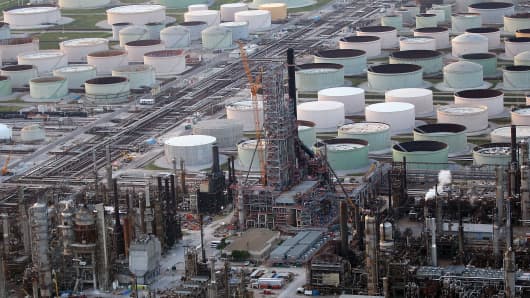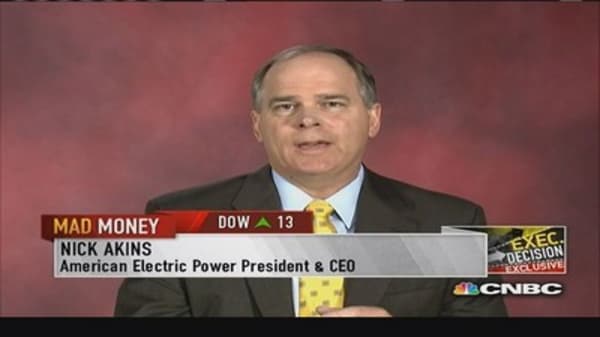Yet based on current trends of declining gasoline use, the gas-to-ethanol mix will eventually have to exceed the 90-to-10 threshold, creating the "blend wall" refiners say could hike production costs and put upward pressure on gas prices.
In June, Chevron warned ethanol mandates may even spur refiners to export gasoline in order to avert the law's punitive effects. That could in turn cut into domestic supplies and put upward pressure on prices.
Last week, the Environmental Protection Agency extended the deadline for energy companies to meet the quotas, while hinting that it may reduce next year's mandates.
Supporters of renewable energy contend the ethanol requirement helps contain gas prices, and curb greenhouse gases. The Renewable Fuels Association, an environmental advocacy group, openly dismisses what it calls Big Oil's "self-inflicted" blend wall, mocking the controversy as little more than "smoke and mirrors."
Still, some refiners—several of which, like ExxonMobil and Valero, have warned about the the blend wall for weeks—say the EPA's delay was not enough.
Critics of the EPA rule argue that most cars can't absorb more than 10 percent biofuel anyway. They also say the problem is being exacerbated by faltering gasoline demand—lower demand for gas, relative to the amount of ethanol that's mandated, makes it costlier for refiners to comply with the rule.
"They're going to have to key in on the reality of what gasoline demand is," said John Felmy, chief economist of the American Petroleum Institute, an oil and gas industry trade association that employs lobbyists in Washington. "The system can't absorb all the ethanol that's mandated."
Based on the current EPA guidelines, refiners have to buy ethanol they can't use, they say, which could result in cutting gas production in a way that pushes up retail prices that are still uncomfortably close to $4 a gallon.
The cost of ethanol credits, which oil companies use to comply with the biofuel guidelines, has skyrocketed because of limited supply in an illiquid market, combined with surging demand from refineries scrambling to comply with the EPA's mandate.
The cost of those credits, or Renewable Identification Numbers (RINs), dropped by 20 percent immediately after the EPA's decision this week. Before this week, however, 2013 RIN prices had soared by 2,300 percent.
"The market for [the credits] has gone through the roof," said Jason Bordoff, director of Columbia University's Center on Global Energy Policy and a former Obama White House adviser on climate change policy.
RIN prices "went up so much because people recognize that there was going to be a shortfall of ethanol to put in the gasoline supply," Bordoff said. "If you're a refiner, there's not going to be enough ethanol to put in the gasoline you produce."
Oil companies have called for the outright repeal of the ethanol mandate, which they argue has elevated gas and diesel prices. Yet the situation with RINs is buffeting the sector, and bears the hallmarks of an asset bubble being inflated by too much demand. In a research note, Deutsche Bank warned investors to stay underweight refineries, calling soaring credit prices a "new demon" destabilizing the sector.
Bordoff supports the biofuel requirement, but said the problem of credits needs to be fixed in the long term.
"If this problem remains unfixed, the amount of high prices the consumer faces will go up over time," Bordoff said. "The EPA is making sure they are stepping in to prevent that."
—By CNBC's Javier E. David





